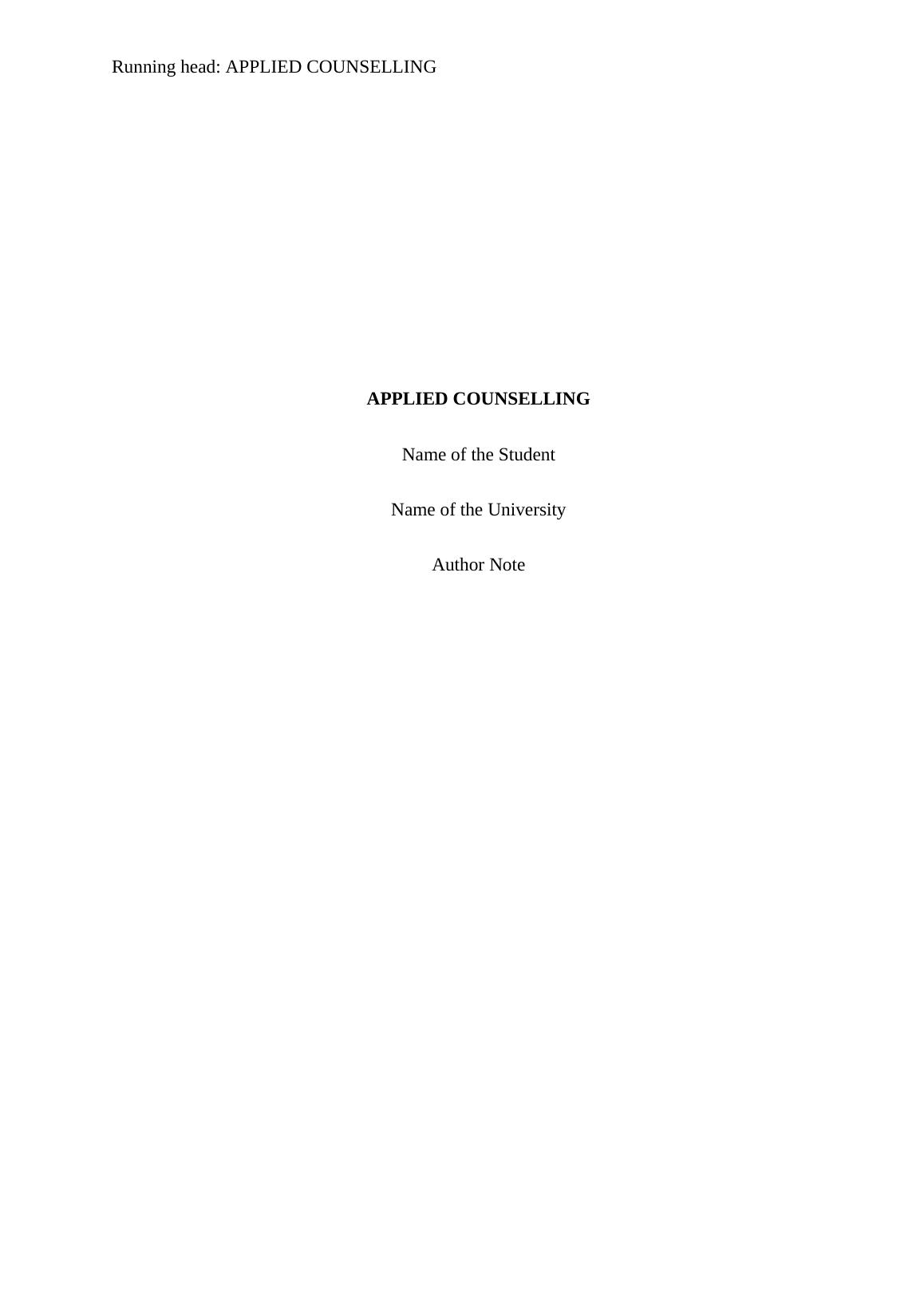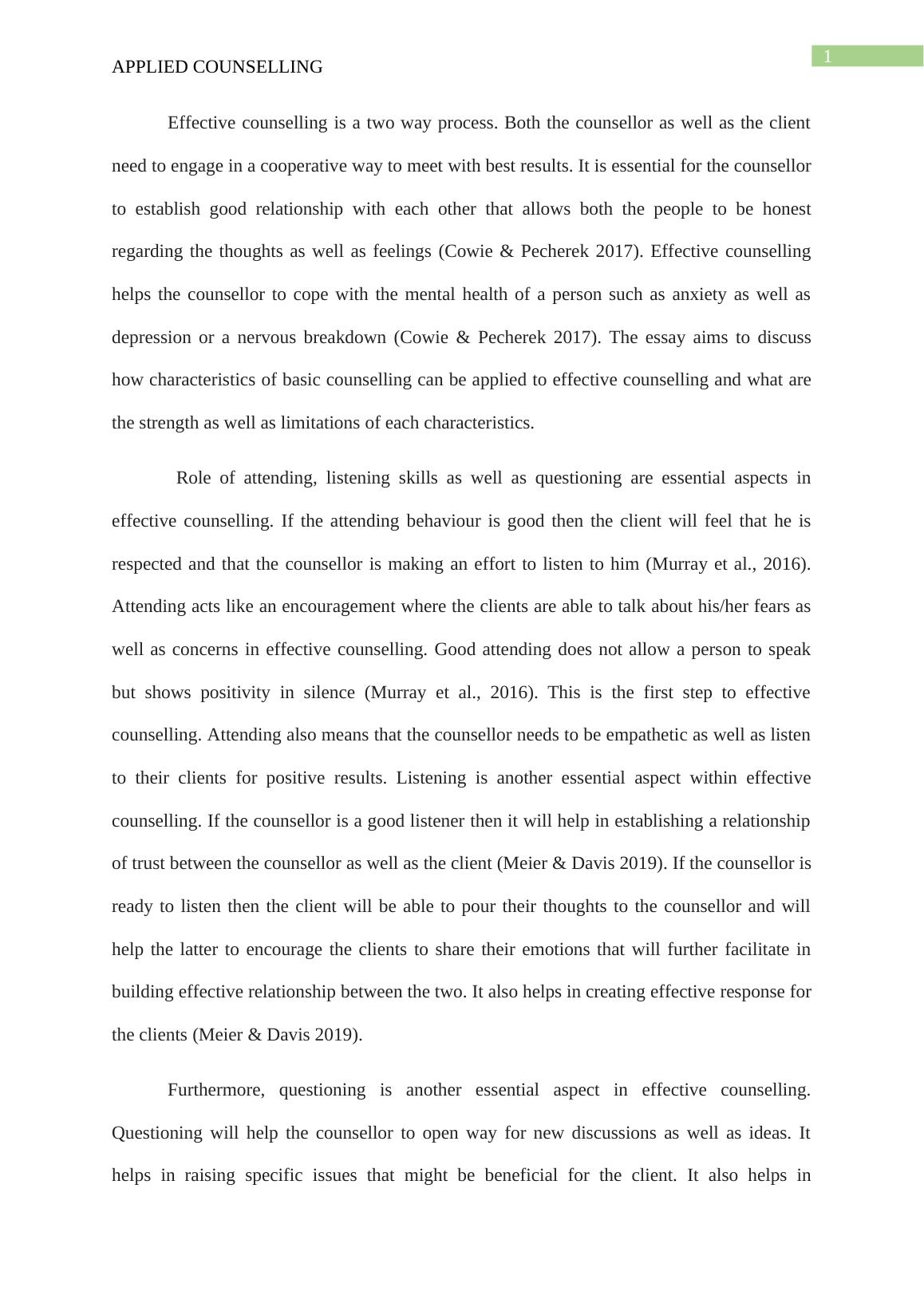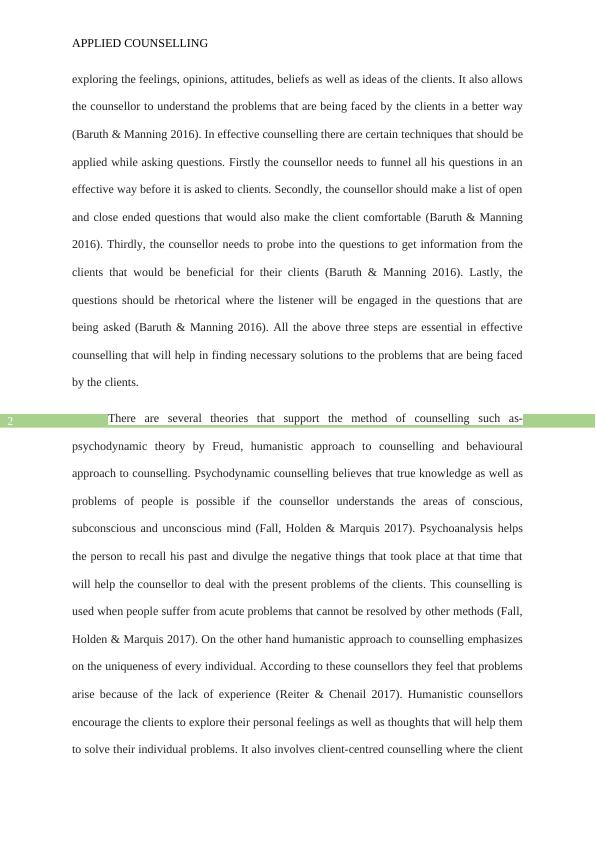Eurasian Journal of Biosciences
8 Pages2018 Words16 Views
Added on 2022-08-25
Eurasian Journal of Biosciences
Added on 2022-08-25
ShareRelated Documents
Running head: APPLIED COUNSELLING
APPLIED COUNSELLING
Name of the Student
Name of the University
Author Note
APPLIED COUNSELLING
Name of the Student
Name of the University
Author Note

1
APPLIED COUNSELLING
Effective counselling is a two way process. Both the counsellor as well as the client
need to engage in a cooperative way to meet with best results. It is essential for the counsellor
to establish good relationship with each other that allows both the people to be honest
regarding the thoughts as well as feelings (Cowie & Pecherek 2017). Effective counselling
helps the counsellor to cope with the mental health of a person such as anxiety as well as
depression or a nervous breakdown (Cowie & Pecherek 2017). The essay aims to discuss
how characteristics of basic counselling can be applied to effective counselling and what are
the strength as well as limitations of each characteristics.
Role of attending, listening skills as well as questioning are essential aspects in
effective counselling. If the attending behaviour is good then the client will feel that he is
respected and that the counsellor is making an effort to listen to him (Murray et al., 2016).
Attending acts like an encouragement where the clients are able to talk about his/her fears as
well as concerns in effective counselling. Good attending does not allow a person to speak
but shows positivity in silence (Murray et al., 2016). This is the first step to effective
counselling. Attending also means that the counsellor needs to be empathetic as well as listen
to their clients for positive results. Listening is another essential aspect within effective
counselling. If the counsellor is a good listener then it will help in establishing a relationship
of trust between the counsellor as well as the client (Meier & Davis 2019). If the counsellor is
ready to listen then the client will be able to pour their thoughts to the counsellor and will
help the latter to encourage the clients to share their emotions that will further facilitate in
building effective relationship between the two. It also helps in creating effective response for
the clients (Meier & Davis 2019).
Furthermore, questioning is another essential aspect in effective counselling.
Questioning will help the counsellor to open way for new discussions as well as ideas. It
helps in raising specific issues that might be beneficial for the client. It also helps in
APPLIED COUNSELLING
Effective counselling is a two way process. Both the counsellor as well as the client
need to engage in a cooperative way to meet with best results. It is essential for the counsellor
to establish good relationship with each other that allows both the people to be honest
regarding the thoughts as well as feelings (Cowie & Pecherek 2017). Effective counselling
helps the counsellor to cope with the mental health of a person such as anxiety as well as
depression or a nervous breakdown (Cowie & Pecherek 2017). The essay aims to discuss
how characteristics of basic counselling can be applied to effective counselling and what are
the strength as well as limitations of each characteristics.
Role of attending, listening skills as well as questioning are essential aspects in
effective counselling. If the attending behaviour is good then the client will feel that he is
respected and that the counsellor is making an effort to listen to him (Murray et al., 2016).
Attending acts like an encouragement where the clients are able to talk about his/her fears as
well as concerns in effective counselling. Good attending does not allow a person to speak
but shows positivity in silence (Murray et al., 2016). This is the first step to effective
counselling. Attending also means that the counsellor needs to be empathetic as well as listen
to their clients for positive results. Listening is another essential aspect within effective
counselling. If the counsellor is a good listener then it will help in establishing a relationship
of trust between the counsellor as well as the client (Meier & Davis 2019). If the counsellor is
ready to listen then the client will be able to pour their thoughts to the counsellor and will
help the latter to encourage the clients to share their emotions that will further facilitate in
building effective relationship between the two. It also helps in creating effective response for
the clients (Meier & Davis 2019).
Furthermore, questioning is another essential aspect in effective counselling.
Questioning will help the counsellor to open way for new discussions as well as ideas. It
helps in raising specific issues that might be beneficial for the client. It also helps in

2
APPLIED COUNSELLING
exploring the feelings, opinions, attitudes, beliefs as well as ideas of the clients. It also allows
the counsellor to understand the problems that are being faced by the clients in a better way
(Baruth & Manning 2016). In effective counselling there are certain techniques that should be
applied while asking questions. Firstly the counsellor needs to funnel all his questions in an
effective way before it is asked to clients. Secondly, the counsellor should make a list of open
and close ended questions that would also make the client comfortable (Baruth & Manning
2016). Thirdly, the counsellor needs to probe into the questions to get information from the
clients that would be beneficial for their clients (Baruth & Manning 2016). Lastly, the
questions should be rhetorical where the listener will be engaged in the questions that are
being asked (Baruth & Manning 2016). All the above three steps are essential in effective
counselling that will help in finding necessary solutions to the problems that are being faced
by the clients.
There are several theories that support the method of counselling such as-
psychodynamic theory by Freud, humanistic approach to counselling and behavioural
approach to counselling. Psychodynamic counselling believes that true knowledge as well as
problems of people is possible if the counsellor understands the areas of conscious,
subconscious and unconscious mind (Fall, Holden & Marquis 2017). Psychoanalysis helps
the person to recall his past and divulge the negative things that took place at that time that
will help the counsellor to deal with the present problems of the clients. This counselling is
used when people suffer from acute problems that cannot be resolved by other methods (Fall,
Holden & Marquis 2017). On the other hand humanistic approach to counselling emphasizes
on the uniqueness of every individual. According to these counsellors they feel that problems
arise because of the lack of experience (Reiter & Chenail 2017). Humanistic counsellors
encourage the clients to explore their personal feelings as well as thoughts that will help them
to solve their individual problems. It also involves client-centred counselling where the client
APPLIED COUNSELLING
exploring the feelings, opinions, attitudes, beliefs as well as ideas of the clients. It also allows
the counsellor to understand the problems that are being faced by the clients in a better way
(Baruth & Manning 2016). In effective counselling there are certain techniques that should be
applied while asking questions. Firstly the counsellor needs to funnel all his questions in an
effective way before it is asked to clients. Secondly, the counsellor should make a list of open
and close ended questions that would also make the client comfortable (Baruth & Manning
2016). Thirdly, the counsellor needs to probe into the questions to get information from the
clients that would be beneficial for their clients (Baruth & Manning 2016). Lastly, the
questions should be rhetorical where the listener will be engaged in the questions that are
being asked (Baruth & Manning 2016). All the above three steps are essential in effective
counselling that will help in finding necessary solutions to the problems that are being faced
by the clients.
There are several theories that support the method of counselling such as-
psychodynamic theory by Freud, humanistic approach to counselling and behavioural
approach to counselling. Psychodynamic counselling believes that true knowledge as well as
problems of people is possible if the counsellor understands the areas of conscious,
subconscious and unconscious mind (Fall, Holden & Marquis 2017). Psychoanalysis helps
the person to recall his past and divulge the negative things that took place at that time that
will help the counsellor to deal with the present problems of the clients. This counselling is
used when people suffer from acute problems that cannot be resolved by other methods (Fall,
Holden & Marquis 2017). On the other hand humanistic approach to counselling emphasizes
on the uniqueness of every individual. According to these counsellors they feel that problems
arise because of the lack of experience (Reiter & Chenail 2017). Humanistic counsellors
encourage the clients to explore their personal feelings as well as thoughts that will help them
to solve their individual problems. It also involves client-centred counselling where the client

End of preview
Want to access all the pages? Upload your documents or become a member.
Related Documents
Applied Counselling | Essaylg...
|8
|2310
|45
Ways Counsellor's Qualities and Counselling Relationship Contribute to Successful Outcomes in Therapylg...
|9
|2017
|86
(PDF) Skills required in counselinglg...
|10
|3359
|263
Seven Core Counselling Skills and Dialogue Samplelg...
|10
|3275
|91
Counselling Theories and Approaches: Case Study Analysislg...
|10
|3708
|107
RUNNING HEAD: PSYCHOLOGY 0 PSYCHOLOGY 1 Psychology 8/5/2019 Summarylg...
|9
|2624
|126
